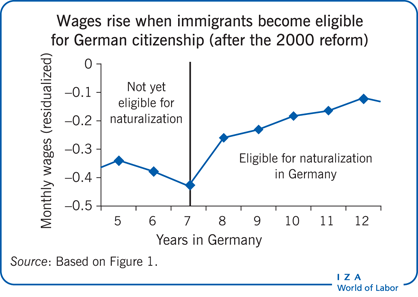Elevator pitch
Politicians, the media, and the public express concern that many immigrants fail to integrate economically. Research shows that the option to naturalize has considerable economic benefits for eligible immigrants, even in countries with a tradition of restrictive policies. First-generation immigrants who are naturalized have higher earnings and more stable jobs. The gains from citizenship are particularly apparent among immigrants from poorer countries. A key policy question is whether naturalization causes labor market success or is taken up by those immigrants who would anyway be most likely to succeed in the labor market.

Key findings
Pros
Citizenship is associated with large and persistent wage gains in most countries.
The wage gains suggest that naturalized citizens “catch up” with earlier immigrants and ethnically similar natives.
Gains are higher for immigrants from poorer countries, who also “catch up” with immigrants from more developed countries over time.
In Germany, women gain more than men; and recent immigrants gain more from access to citizenship than traditional guest workers.
Cons
Citizenship appears to have no effect on labor force participation in some countries.
Public transfers such as welfare or unemployment insurance benefits slightly increase following naturalization.
With the exception of Norway and Sweden, the propensity to naturalize is relatively low in European countries.
It is not clear if naturalization causes labor market success or is taken up by those immigrants most likely to succeed anyway.
There is a lack of research on how access to citizenship affects the social and political integration of immigrants.